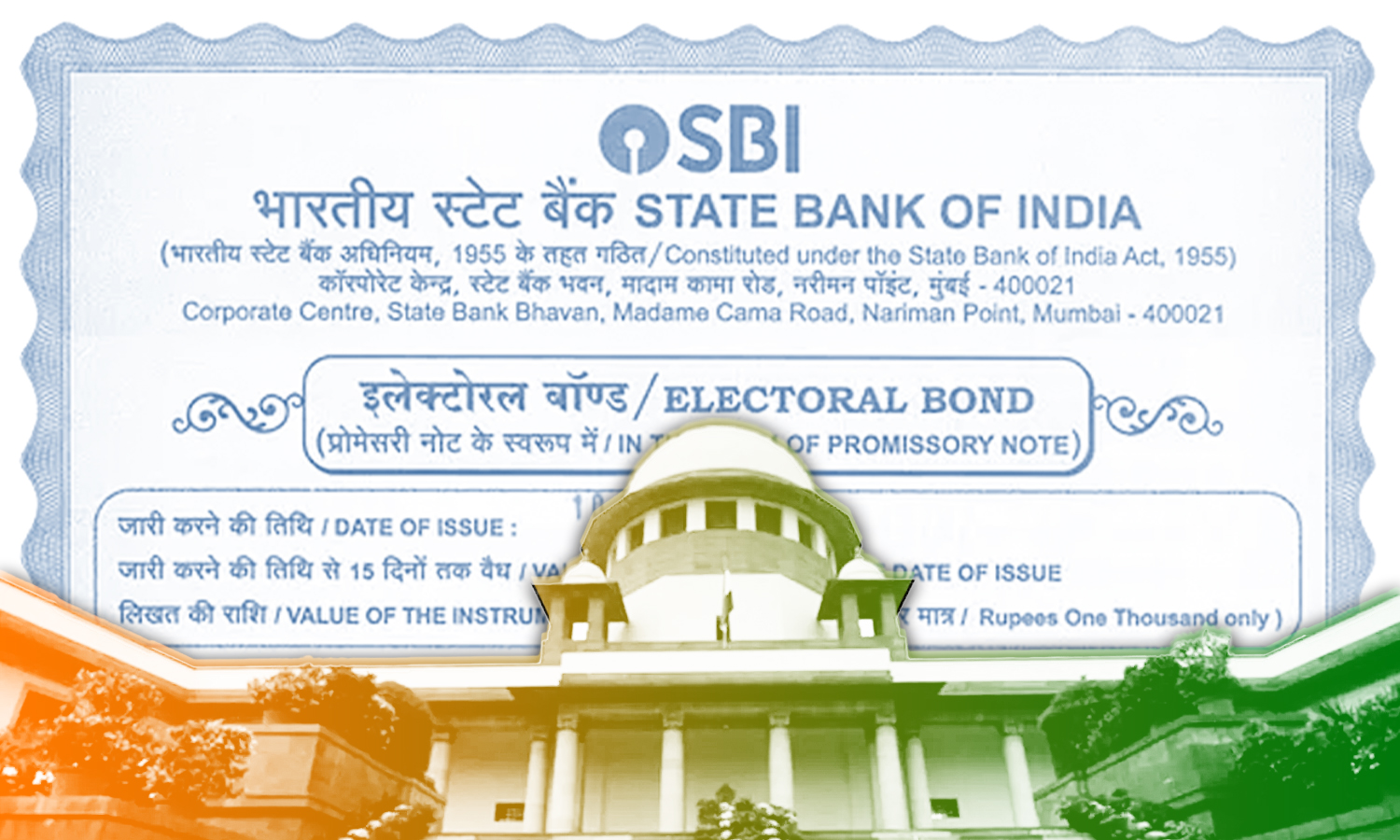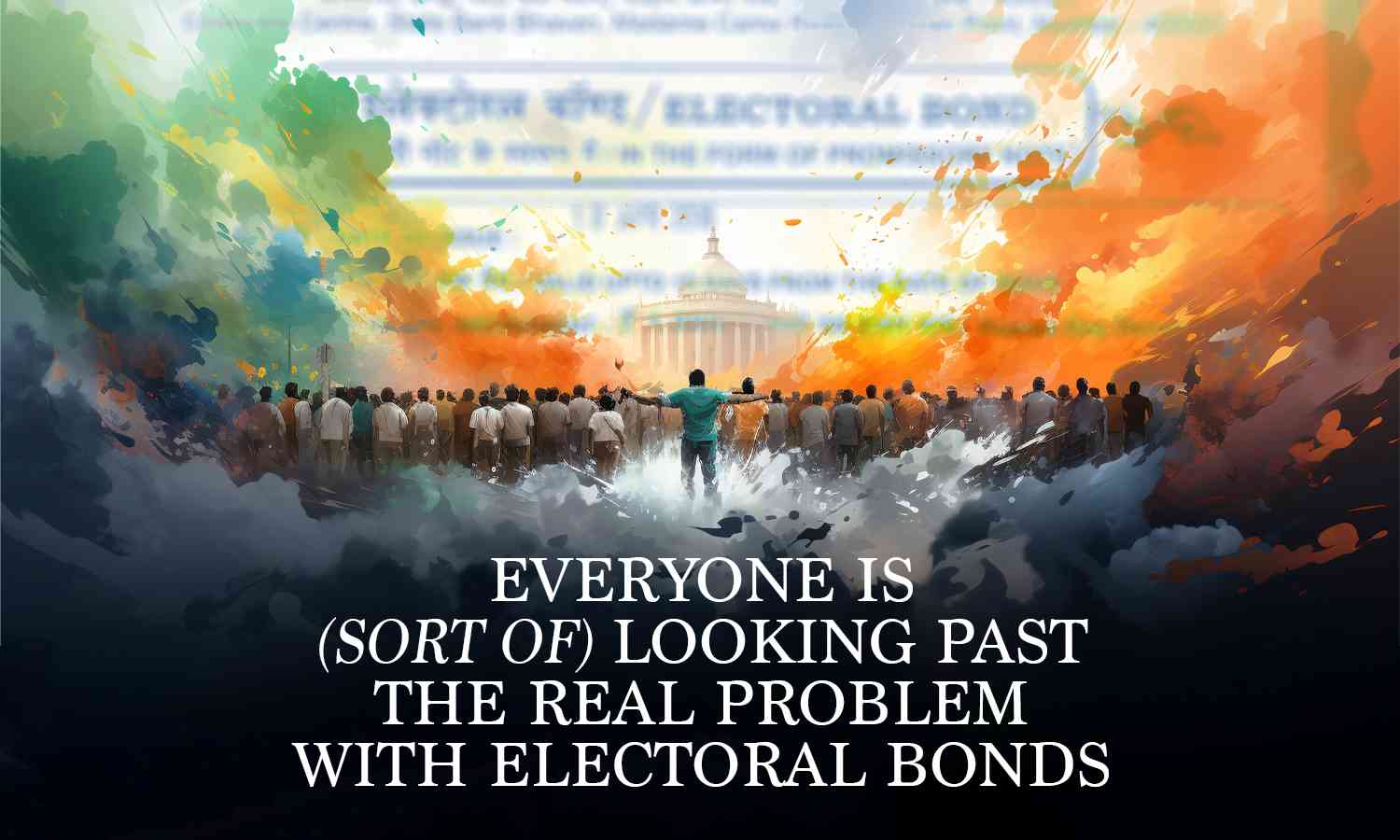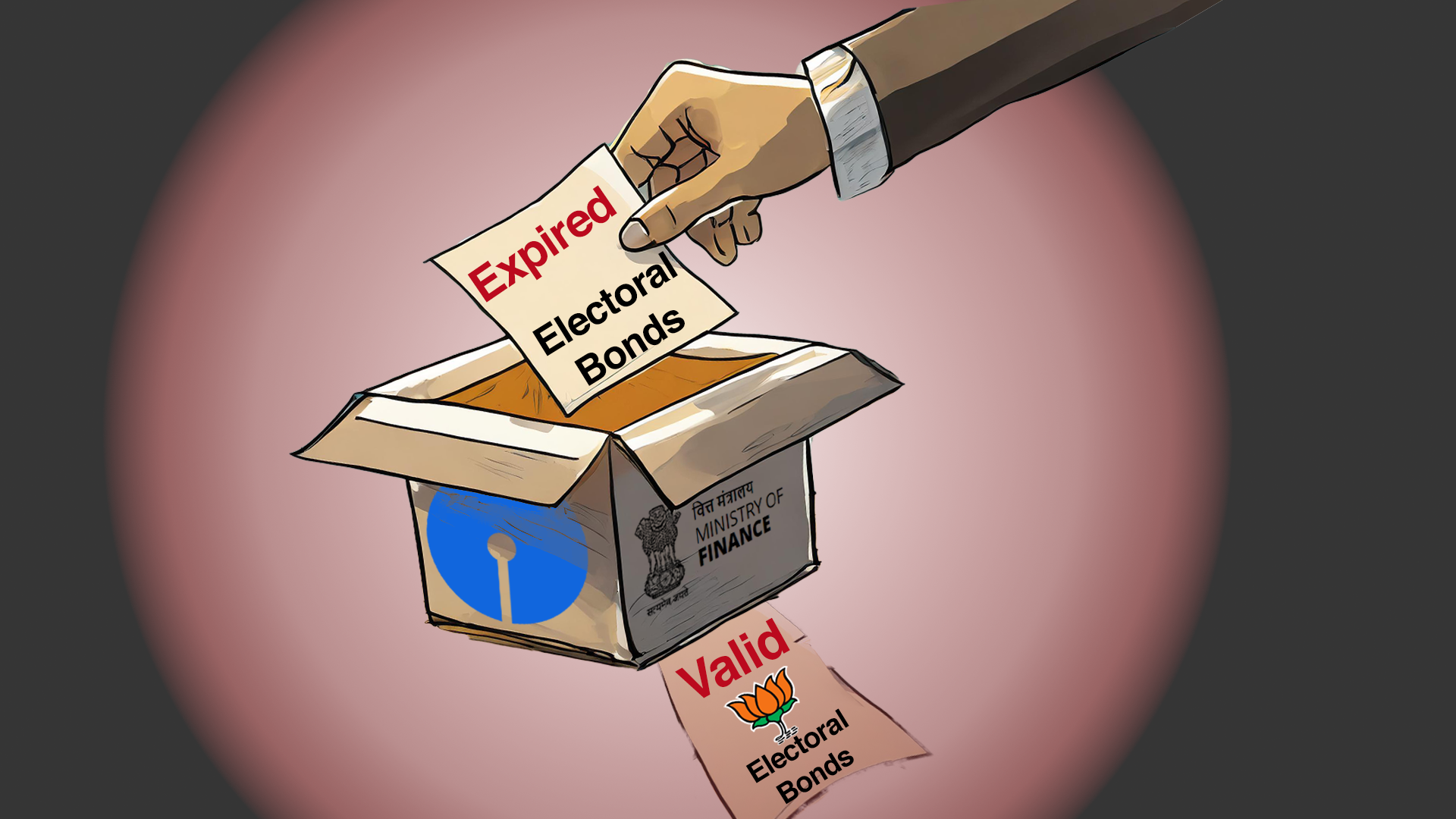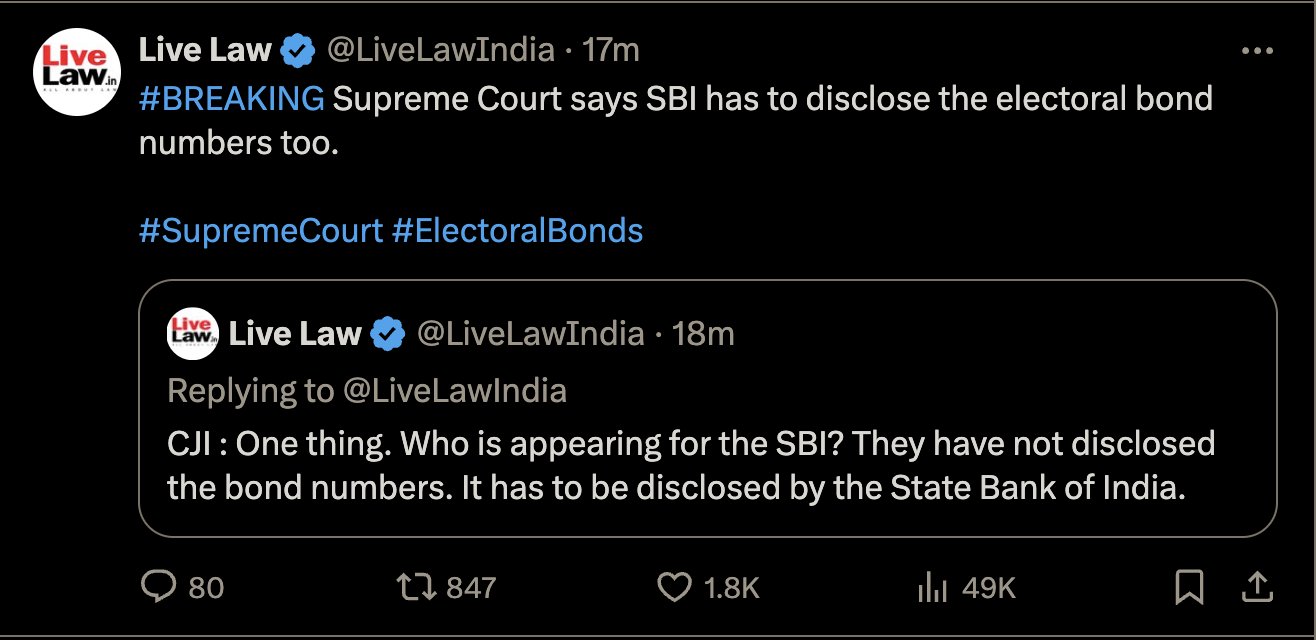“As we, the people, the media, the conversationalists indulge ourselves to a point of fellatio, we should not forget that there is a planet sized blindspot about the Electoral Bonds. Perpetuated & upheld purely on the myth that whoever bought the Bonds, was the same person who donated it to the political parties. Thereby, completely overlooking the money laundering possibilities of something that is now declared unconstitutional by the highest court of the land.”

Explaining The Electoral Bonds Case in the Simplest Way Possible
Electoral bonds (EBs) operate much like regular currency notes as they were considered "bearer" instruments. This means that whoever held them was deemed the owner. They came in various denominations, including 1 thousand, 10 thousand, 1 Lakh, 10 Lakh, and 1 Crore rupees Bonds, bought exclusively at SBI Branches across India. Individuals, groups, or corporate organisations could purchase these bonds and contribute them to the political party of their choice.
Unlike traditional financial instruments, electoral bonds do not accrue interest. Instead, the political party receiving the bonds could redeem them after a specified period, which was typically 15 days. This means that the party could convert the bonds into usable funds without any additional financial burden in the form of interest payments. This was also an opaque system, in fact anonymity was the USP it was built and sold on.
India's Supreme Court made a significant ruling on the 15th Feb 2024 by banning electoral bonds, which have long been a contentious and opaque source of funding for political parties. The decision came in response to an ongoing petition urging the abolition of electoral bonds, highlighting the growing concern over their use in political financing.
Electoral bonds have been a subject of intense scrutiny due to their secretive nature and potential for misuse. In November, the Supreme Court expressed reservations about the scheme, noting that it fosters opacity and could facilitate money laundering. This criticism underscored the need for greater transparency and accountability in political funding.
The ban on electoral bonds marks a significant development in India's electoral landscape. By eliminating this controversial funding mechanism, the Supreme Court aims to address the concerns surrounding the influence of undisclosed money in elections. This decision is a step towards promoting fair and transparent electoral practices, essential for upholding the integrity of the democratic process.
The ruling is expected to have far-reaching implications for political parties, particularly those that have benefited from the influx of funds through electoral bonds. As accusation of quid-pro-quo fly in the politicalverse, this decision underscores the importance of reforming campaign finance laws to prevent undue influence and ensure that electoral processes remain free from manipulation.
[Image Courtesy - The Reporter's Collective]
In the Post-Supreme-Court-Verdict-SBI-Release-All-Data World
In the wake of recent data revelations, independent media outlets have been operating at full throttle, diligently uncovering stories that many mainstream sources have been hesitant to touch. Meanwhile, opposition voices have been quick to point fingers, alleging connections between Enforcement Directorate (ED) and Central Bureau of Investigation (CBI) raids and undisclosed payouts.
It's not hard to imagine that internet sleuths everywhere have constructed elaborate conspiracy boards, connecting the dots with countless miles of red threads linking names and photos. These enthusiasts likely feel they're on the brink of major breakthroughs, fuelled by the desire to unearth hidden truths.
Credit is undoubtedly due to individuals like Sr. Advocate Prashant Bhushan, Journalist Poonam Agarwal and the dedicated teams at media outlets such as Reporter's Collective, The Quint, The Wire, Newslaundry, Deshbhakt, and the hard-hitting journalism of Ravish Kumar and Dhruv Rathee. Their tireless efforts can be seen as nothing short of heroic, as they strive to hold power to account and keep the public informed.
As citizens of India, we deserve a political landscape free from corruption, a judiciary committed to fair and just practices, and access to information in a transparent manner. These dedicated individuals and media organisations play a crucial role in raising awareness and holding those in power accountable. It's only fitting that we acknowledge and appreciate their contributions, as they work tirelessly to empower the public and uphold democratic principles. It's a poignant observation, and one that resonates deeply with the reality of everyday life in India. Despite the recent spotlight on issues like quid pro quo arrangements, it's easy to get caught up in the minutiae and miss the broader picture. Like missing the forest for a tree.
[Image Courtesy - Live Law]
Missing the Electoral Bond Grey Market Link
As I scroll through my timelines and observe online discourse, I can't help but notice a tendency among people to opt for the easy win. Quid pro quo, while significant, might just be the tip of the iceberg in a much larger systemic issue. Many would argue that such transactions are nothing new – they're part and parcel of the political and social fabric of our country. In the India I know, it's almost become ingrained in our collective consciousness that industrialists grease the wheels of bureaucracy with financial incentives, and that law enforcement officers sometimes turn a blind eye to minor infractions in exchange for a little extra cash. These occurrences are so commonplace that they've almost become comedic fodder, ripe for memes and shared jokes.
But beneath the surface humour lies a deeper truth: this normalisation of corruption erodes the very foundations of our society. It perpetuates a culture of impunity and undermines trust in institutions meant to uphold justice and fairness. While we may chuckle at these anecdotes, they serve as stark reminders of the challenges we face in building a truly equitable and just society.
It's essential to move beyond the surface level and confront the root causes of these issues head-on. Only then can we hope to enact meaningful change and foster a culture where integrity and accountability are valued above all else.

India - A Land of Moral Adjustments & Get-Rich-Quick Schemes
My words might cut straight to the heart of a complex reality many choose to ignore. But it's the harsh truth, one that bears examination if we are to truly understand the dynamics of living in our nation. The sentiment that many Indians prioritise survival over ethical considerations is not unfounded. When faced with the daily struggle to put food on the table, moral quandaries often take a backseat. It's a sad reality that for a significant portion of our population, the need for something extra to ensure basic comforts is a harsh reality.
In this landscape, political corruption is often viewed through a pragmatic lens. Many perceive politics itself as synonymous with corruption, an unavoidable aspect of the system. The prevailing narrative pits strongmen against each other, with the expectation that political parties will employ any means necessary to secure power and wealth. It's a narrative as old as time, deeply ingrained in our collective consciousness.
The silence of certain media channels, often dubbed "GODI media”, shouldn't come as a surprise. Their financial interests are closely tied to the very political parties, governments, and businesses that are under scrutiny. Dependence on advertising revenue from these entities can compromise journalistic integrity, leading to selective reporting or outright silence on certain issues. Similarly, the proliferation of misinformation by troll farms, social media engagement teams, and IT cells is a reflection of the times we live in. Many of these individuals are driven by economic desperation, lacking education and opportunities. While their actions may sow discord and confusion, it's important to recognise the systemic issues that push them into such roles.
We live in a world where survival often takes precedence over morality, everything seems to follow a predetermined course. It's a sobering reality, one that demands introspection and a commitment to addressing the root causes of societal inequities. Only by acknowledging these truths can we begin to forge a path toward a more just and equitable future.
Is it Really that much of a an Uncomfortable Conversation
Navigating discussions with certain segments of society, like the residential complex WhatsApp uncles, can indeed be challenging. It's often necessary to approach these conversations with a fresh perspective, steering away from politically charged rhetoric. In my attempts to broach topics such as the Electoral Bonds case in casual settings like lifts or parking lots, I've come to realise that conventional arguments – the "Burn it all down" mentality, dismissive attitudes like "Okay, So what?" or resigned acceptance with "Yeah, I get it but nothing is going to happen" – rarely lead to meaningful dialogue or change of opinion. To truly engage these individuals and potentially spark a breakthrough, it's essential to adopt a non-political approach. This might involve reframing the discussion in terms of broader societal values, such as transparency, accountability, and fairness. By highlighting how issues like electoral bonds impact not just political dynamics but also trust in institutions and the overall welfare of society, we can transcend partisan divides and foster genuine understanding. Emphasising on the tangible consequences of political decisions on everyday life – whether it's access to resources, economic opportunities, or the quality of public services – can resonate more deeply with individuals who may otherwise feel disconnected from political discourse. Ultimately, by finding common ground and framing discussions in relatable terms, we can bridge the gap between differing perspectives and work towards a more informed and engaged citizenry.
I’ll Wrap This Up with a Tin-Foil Hat
But Abhishake, you might say - “They are saying that the powers that be, have used investigative agencies as an extraction tool. They raided the businesses, and then those businesses suddenly bought EBs. There is no grey area here, the ones in power pressured people into getting paid - Case Closed. To which I say, I didn’t realise we were on a first name basis, but I like that we are close like that in your head. And follow it up by saying that - This being merely an extortion racket is too simplistic an answer for me. Financial crimes are never a straight line. And I believe deeply in the intellect of the Indian money-making brains. I believe that there are layers to this saga, and not every layer will ever be fully open.
Was Electoral Bond a smart move on the ruling govt? Maybe. Every political party does this, it is noting new. Let’s not go into details on the most obvious layer. Was it the smartest? Well…There was a paper trail all along, the timing of the ED/CBI/IT raids to the purchases is very sus, but that’s too is obvious. It might be terrible for our democracy and constitutional integrity, but this basic revelation should not surprise anyone.
See, this is a the kind of crime that makes the stupid feel smart. The righteous fight for transparency, the top court taking institutions like SBI to the cleaners, the smell of retribution and vindication in the air - all that is very romantic and very consuming as emotions by themselves. But a really smart criminal would anticipate this, they will use misdirection - They will sacrifice the tail, like any lizard will to survive.
A smart criminal will hide the real heist under tons of truth and a spectacle.
Here are my arguments in simple pointers:
- Is some of the money that was given to the political parties done purely to gain favours from the govt? 100 percent.
- Is that great for the country? No. Did some donors buy the EBSs out of fear or as a palm grease? Surely.
- Were some of the bonds bought by general public who genuinely just wanted to support their chosen political party or leader - Absolutely.
But all of those are boring. All of those are obvious, first level, low-hanging fruit type stuff. I wouldn’t do it like that, hypothetically. I would layer it up, and I’m NOT that smart. But I know one thing - the best way to avoid getting caught is to avoid any paper trail.
So say…hypothetically, I am a person with lots of liquid cash at hand, that I have not disclosed to the govt. It maybe because I do not want to pay taxes, or I have acquired the money through channels that are illegal or criminal. Now I want to turn all this black money white. Previously, I would use this money to fund my local politician, and gain from my influence & closeness to power. But my gains are still dependent on someone else’s grace. Now, though it’s rampant, it’s still a crime. And me, the criminal, needs this to be fixed. Suddenly, I read in the papers that there is a way you can disperse all the cash, anonymously, and legally give it to the powers that be, for influence, patronage or just out of the goodness of my heart. So what do I do? Obviously that.
But what if in the future the courts pull away the veil of anonymity from this Electoral Bond thing, what then? People in uniforms & govt badges will show up and I will be asked to explain the origins of all that cash I suddenly seem to have. What will be I do then? So I will be smart - I will get someone with white money buy the Bond and then sell it to me.

Which brings me to the most most important part everyone is overlooking that there isn’t a straight simple line between the buyer and the donator of the EBs. We should remember that there is a planet sized blindspot about the Electoral Bonds in the general public - Perpetuated & upheld purely on the myth that whoever bought the Bonds, was the same person who donated it to the political parties. There is no data backing that. So while everyone fights over this party, that party; they took more, we took less - We all are completely overlooking the immense money laundering possibilities of something that is now declared unconstitutional by the highest court of the land. This is where, me, the hypothetical criminal with a lot of black money, will want to come into play.
Now, say, hypothetically, I have a friend. Let’s call him Player 1. He deals in a lot of cash, as a consequence of his business. Say, hypothetically, he runs a casino, or a lottery business. And say, hypothetically, he is in good books with the ruling class, irrespective of any political party affiliation or state. So Player 1 goes to SBI, buys a bond worth 1 Crore. I meet Player 1 over “tea”, and he tells me about his purchase. What a predicament, I tell Player 1 that I have a lot of cash piled up, and if he can help me turn by black money white.
Player 1, being the upstanding& benevolent person that he is, agrees to help. He asks me, hypothetically, to come to is place of business, which for this example let’s consider it to be a casino, with my cash. He asks me a 30% tax for his troubles. I agree, and I pay Player 1 a crore and 30 lakhs in cash, he gives me the 1Cr EB. Boom! Suddenly all my money is legal, and Player 1 has just made 30L on his investment. But this might get him in trouble, you might think. How will he account for that additional 30L? He doesn’t have to. Not if the transaction occurred as his real business. Not if I found a way to lose that amount in his casino while playing blackjack. On the other side, Player 1 can also take a lot of my cash, and in turn make me win in his casinos, or through a lottery ticket win. No one is paying attention, and everyone who wants gains is gaining hands over fists. In the meanwhile, that bond, has already exchanged multiple hands, turning multifold of its value from dirty to clean. Will we ever know about those transactions? I won’t hold my breath for it.
Let’s think - What are the other sectors with a lot of black money inflow. Is it Real Estate? Is it Construction? Is it Infrastructure development? Is it Finance & banking? Healthcare, Retail or Tech perhaps? Now revisit the list of names who have purchased the said EBs, and make your your own mind up about it. I’m not saying anything more, or pointing my finger at anyone. I don’t know enough. But I know there is always a bigger story behind the headlines.
I dunno what the purpose of this electoral bond really was, I will never know. Whatever I will say will be speculation. But if an idiot like me can figure this out, there are much smarter people out there. The Electoral Bonds seem to be, at least to me, speculatively and hypothetically, a very very easy way to launder insane amounts of money with no trace. The Electoral Bond Case being related purely to monetary gains of some or all political parties is a very surface level view of what this actually is. We are looking at the lizard’s tail, that the lizard has sacrificed to save the rest of its body, knowing full well it will grow back. Because it always grows back. The lizards change, their tactics don’t.
*The views expressed in this article are personal. They do not reflect the opinions, beliefs, or positions of Vygr and Vygr Media Private Limited.





























